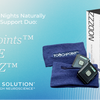Cortisol, Stress, and Sports: How Hormonal Balance Affects Your Game

In the rapidly changing realm of student life, success is often linked to academic achievements and overall well-being. While striving for excellence, students often deal with elevated stress levels, which can impact various aspects of their lives, including their participation in sports. A crucial hormone that plays a significant role in this dynamic is cortisol. This article delves into the relationship between cortisol, stress, sports performance, and how TouchPoint Solution can be a valuable tool in promoting student success and well-being.
Cortisol and Stress: A Balancing Act
Cortisol, often referred to as the "stress hormone," is produced by the adrenal glands in response to various physical and psychological stressors. While cortisol is a natural and essential part of our body's stress response, chronic stress can consistently elevate cortisol levels, harming health and well-being. For students, the pressures of exams, assignments, and extracurricular activities can contribute to prolonged stress, disrupting the delicate hormonal balance.
Impact on Sports Performance
The effects of elevated cortisol levels extend beyond mental and emotional well-being; they can also affect physical performance, including engagement in sports. High cortisol levels can lead to decreased muscle tissue, impaired recovery, and reduced energy levels. Students engaging in sports may find their performance hindered due to reduced endurance, slower recovery times, and increased susceptibility to injuries.
The Role of TouchPoint Solution
Addressing stress and its impact on academic and athletic performance is crucial for student success. This is where innovative solutions like the TouchPoint™ technology come into play. TouchPoints are non-invasive, wearable devices that use gentle vibrations to alter the body's stress response. By utilizing a specific neuroscience principle known as bilateral alternating stimulation tactile (BLAST), TouchPoints can help lower cortisol levels, reduce stress, and promote a balanced state of mind.
How TouchPoint Works
TouchPoint devices work by delivering gentle vibrations that have been shown to activate the body's "rest and digest" response, counteracting the effects of the "fight or flight" response triggered by stress. By wearing TouchPoints during stressful situations such as exams or sports competitions, students can potentially experience reduced cortisol levels, improved focus, and enhanced emotional well-being.





